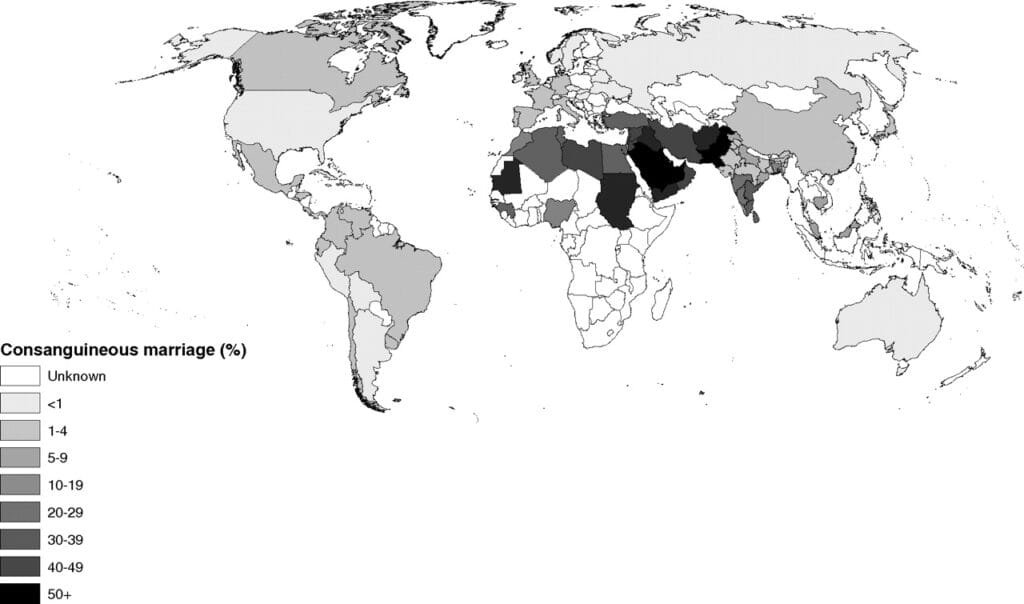The Role of Genetic Counseling in Managing Consanguineous Marriages
Introduction
In many parts of the world, especially India, the Middle East, and North Africa, consanguineous marriages (unions between biologically related individuals) are a long-standing social and cultural norm. While these relationships offer social and familial advantages, they also carry a higher risk of genetic disorders in offspring due to shared ancestry and inherited genes [1][2].
Genetic counseling plays a crucial role in helping such couples make informed decisions about starting or expanding their families. It offers not just a clinical service but a personalized approach to managing inherited risks with clarity and care.
Genetic Risks in Consanguineous Marriages
Every individual carries approximately four to five autosomal recessive gene mutations—most of which do not affect them unless their partner also carries a mutation in the same gene [3]. In consanguineous unions, particularly between first cousins, the chance of both partners carrying the same mutated gene increases due to shared ancestry [4].

If both partners are carriers of the same autosomal recessive condition, the risk for each child is:
- 25% chance the child will be affected
- 50% chance the child will be a carrier
- 25% chance the child will be unaffected and not a carrier [5]
You can read more about carrier screening in our previous post, “Carrier Screening for Couples: A Guide to Informed Parenthood.”
Commonly observed conditions in consanguineous families include:
- Beta-Thalassemia
- Spinal Muscular Atrophy (SMA)
- Maple Syrup Urine Disease
- Certain lysosomal storage disorders
- Intellectual disability syndromes [6][7]
Studies from South Asia and the Middle East report up to a 2.5-fold increased risk of congenital disorders in consanguineous populations [8].
How Genetic Counseling Helps
- Risk Assessment: Your genetic counselor will collect a detailed three-generation family history (pedigree) to identify known or suspected inherited disorders [9].

- Carrier Screening: Expanded carrier screening panels test for dozens to hundreds of recessive and X-linked conditions, even when there is no known family history [10][11].
- Interpretation of Results: Counselors explain what carrier status means for reproductive outcomes, clarifying that being a carrier does not affect one’s own health but can impact offspring if both partners carry the same variant [12].
- Psychosocial & Cultural Support: Understanding that consanguinity is deeply rooted in culture, counselors approach discussions without judgment, offering emotional support and guiding couples respectfully and non-directive [13].
Read more about our process in “Understanding the Genetic Counseling Process: A Comprehensive Guide.”
Reproductive Options and Next Steps
When both partners are carriers, options include:
- IVF with Preimplantation Genetic Testing (PGT): Embryos are tested before implantation to select unaffected embryos [14].
- Prenatal Diagnostic Testing: CVS (10–13 weeks) or amniocentesis (15–20 weeks) can diagnose the condition in utero, enabling informed decisions [15].
- Donor Gametes: An option for couples wishing to avoid risk while carrying a pregnancy.
Undergoing genetic counseling before conception provides time to consider these choices calmly and privately [16].
Ethical & Cultural Sensitivity
A cornerstone of genetic counseling is respect for diverse cultural, social, and religious values. Counselors do not discourage consanguineous unions; instead, they ensure couples are fully informed of their reproductive risks and options in a supportive, non-judgmental environment [17].
Conclusion
While consanguineous marriages carry increased genetic risks, genetic counseling offers clarity, choice, and support. Couples can explore carrier screening, risk assessment, and reproductive planning with confidence and care.
If you and your partner share a biological relationship or have a family history of genetic conditions, consider scheduling a genetic counseling session.
We are here to guide you every step of the way.
References
- Hamamy, H. (2012). Consanguineous marriages: Preconception consultation in primary health care settings. Journal of Community Genetics, 3(3), 185–192.
- Modell, B., & Darr, A. (2002). Genetic counselling and customary consanguineous marriage. Nature Reviews Genetics, 3(3), 225–229.
- Bell, C. J., et al. (2011). Carrier testing for severe childhood recessive diseases by next-generation sequencing. Science Translational Medicine, 3(65), 65ra4.
- Tadmouri, G. O., et al. (2009). Consanguinity and reproductive health among Arabs. Reproductive Health, 6(1), 17.
- Bittles, A. H. (2008). A community genetics perspective on consanguineous marriage. Community Genetics, 11(6), 324–330.
- Al-Gazali, L., & Hamamy, H. (2014). Consanguinity and dysmorphology in Arabs. Human Heredity, 77(1–4), 93–107.
- Alkuraya, F. S. (2013). Genetics and genomic medicine in Saudi Arabia. Molecular Genetics & Genomic Medicine, 1(3), 103–109.
- Shawky, R. M., et al. (2011). Consanguineous matings among Egyptian population. Egyptian Journal of Medical Human Genetics, 12(2), 157–163.
- Resta, R. G. (2006). The new definition of genetic counseling: A point of view. Journal of Genetic Counseling, 15(2), 77–83.
- Lazarin, G. A., et al. (2013). Carrier screening: Past, present, and future. Journal of Clinical Medicine, 2(3), 313–329.
- Beauchamp, K. A., et al. (2019). Expanded carrier screening in reproductive healthcare: A survey of current practice. American Journal of Obstetrics and Gynecology, 220(3), 294.e1–294.e11.
- Ioannou, L., et al. (2014). Population-based carrier screening: A scoping review. European Journal of Human Genetics, 22(8), 956–965.
- Weil, J. (2002). Genetic counseling in the era of genomic medicine. Seminars in Medical Genetics, 106(4), 197–201.
- Harper, J. C., et al. (2010). Preimplantation genetic diagnosis: State of the art. Human Reproduction Update, 16(5), 415–429.
- Wapner, R. J., et al. (2012). Chromosomal microarray versus karyotyping for prenatal diagnosis. New England Journal of Medicine, 367(23), 2175–2184.
- De Wert, G., et al. (2014). Preconception care and genetic risk. European Journal of Human Genetics, 22(5), 572–578.
- Dheensa, S., et al. (2017). Ethical issues in genetic counselling with consanguineous couples. Journal of Medical Ethics, 43(10), 692–697.
- Bittles, A. H., & Black, M. L. (2010). Consanguinity, human evolution, and complex diseases. Proceedings of the National Academy of Sciences, 107(Suppl 1), 1779–1786.

Very well written and easy to understand blog about consanguineous marriage and genetic risk. Many such couples struggle with repeated miscarriages or infertility and are absolutely unaware of genetic abnormalities could be the reason behind it. Through your blog you have shared not just the knowledge but possible steps to be taken to deal with these issues which definitely will be helpful for couples in consanguineous marriages.